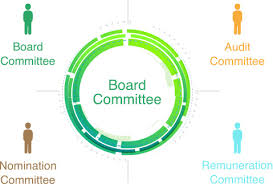The Audit Committee and Nomination and Remuneration Committee are two separate committees typically found in a company’s corporate governance structure. Similar Element in Audit Committee and Nomination and Remuneration Committee is Independent Directors
The Audit Committee is responsible for overseeing the company’s financial reporting and ensuring that financial statements are accurate and reliable. This committee is typically composed of independent directors who have expertise in accounting and financial reporting.
Table of Contents

On the other hand, the Nomination and Remuneration Committee is responsible for identifying and nominating suitable candidates for directorship positions, as well as setting remuneration policies for executive directors and senior management. This committee is typically composed of independent directors who have expertise in human resources and compensation.
The Audit Committee focuses on financial reporting and ensuring financial transparency, while the Nomination and Remuneration Committee focuses on identifying and selecting suitable candidates for directorship positions and setting compensation policies. Both Audit Committee and Nomination and Remuneration Committee play major role in Corporate Governance.

Governing Sections for the Audit Committee and Nomination and Remuneration Committee
In India, the governing sections for the Audit Committee and Nomination and Remuneration Committee are primarily set out in the Companies Act, 2013 and the Securities and Exchange Board of India (SEBI) Listing Regulations, 2015.
- Audit Committee: As per Section 177 of the Companies Act, 2013 and Regulation 18 of the SEBI Listing Regulations, 2015, listed companies are required to constitute an Audit Committee consisting of at least three directors, with a majority of them being independent directors. The governing section for the Audit Committee also lays out the powers, functions, and responsibilities of the committee, which include overseeing financial reporting, internal controls, and risk management, appointing and fixing the remuneration of the statutory auditors, and reviewing the company’s financial statements, among other things.
- Nomination and Remuneration Committee: As per Section 178 of the Companies Act, 2013 and Regulation 19 of the SEBI Listing Regulations, 2015, listed companies are required to constitute a Nomination and Remuneration Committee consisting of at least three directors, with a majority of them being independent directors. The governing section for the Nomination and Remuneration Committee lays out the powers, functions, and responsibilities of the committee, which include identifying and selecting suitable candidates for appointment as directors or key managerial personnel, recommending remuneration policies and packages for directors, key managerial personnel and other employees, and evaluating the performance of directors and key managerial personnel.
Audit Committee and Nomination and Remuneration Committee in a Point-Wise Manner
- Oversees the financial reporting process of the company.
- Ensures that financial statements are accurate and reliable.
- Reviews the company’s financial controls and risk management systems.
- Appoints and oversees the external auditors of the company.
- Composed of independent directors with expertise in accounting and financial reporting.
Nomination and Remuneration Committee:
- Identifies and nominates suitable candidates for directorship positions.
- Sets the remuneration policies for executive directors and senior management.
- Reviews the performance of the company’s directors.
- Ensures that the company has a succession plan in place.
- Composed of independent directors with expertise in human resources and compensation.
Overall, the Audit Committee is responsible for ensuring financial transparency and accuracy, while the Nomination and Remuneration Committee is responsible for selecting the right people for directorship positions and ensuring appropriate compensation policies are in place. Both Audit Committee and Nomination and Remuneration Committee are part of SEBI (LODR), 2015
Table Summarizing the Key Differences between the Audit Committee and Nomination and Remuneration Committee
| Audit Committee | Nomination and Remuneration Committee |
|---|---|
| Oversees the financial reporting process of the company. | Identifies and nominates suitable candidates for directorship positions. |
| Ensures that financial statements are accurate and reliable. | Sets the remuneration policies for executive directors and senior management. |
| Reviews the company’s financial controls and risk management systems. | Reviews the performance of the company’s directors. |
| Appoints and oversees the external auditors of the company. | Ensures that the company has a succession plan in place. |
| Composed of independent directors with expertise in accounting and financial reporting. | Composed of independent directors with expertise in human resources and compensation. |
Illustrate the difference between the Audit Committee and Nomination and Remuneration Committee
Examples of Audit Committee and Nomination and Remuneration Committee
Let’s say that a company is preparing its financial statements for the year and the Audit Committee is responsible for reviewing these statements to ensure that they are accurate and reliable. The committee may review the company’s financial controls and risk management systems to ensure that they are sufficient to prevent errors and fraud in financial reporting. Additionally, the Audit Committee may appoint and oversee the external auditors who will review the financial statements and provide an opinion on their accuracy. The committee’s focus is primarily on ensuring financial transparency and accuracy.
Suppose that a company is looking to fill a vacancy for a directorship position and the Nomination and Remuneration Committee is responsible for identifying and nominating suitable candidates. The committee may review the qualifications and experience of potential candidates to ensure that they have the necessary skills to contribute to the company’s success. Additionally, the committee may set remuneration policies for executive directors and senior management, including their salaries, bonuses, and other benefits. The committee’s focus is primarily on ensuring that the right people are in place to lead the company and that they are appropriately compensated for their work.
Overall, while both committees play important roles in a company’s governance structure, their responsibilities and focus areas differ significantly. The Audit Committee focuses on financial reporting and transparency, while the Nomination and Remuneration Committee focuses on human resources and compensation. Both Audit Committee and Nomination and Remuneration Committee are the part of Companies Act, 2013.

Audit Committee and Nomination and Remuneration Committee General Meaning
Audit Committee:
An Audit Committee is a group of independent directors appointed by a company’s board of directors to oversee the company’s financial reporting process. The main purpose of an Audit Committee is to ensure that the company’s financial statements are accurate and reliable. The committee is responsible for reviewing the company’s financial controls and risk management systems, appointing and overseeing the external auditors, and ensuring that the company is complying with relevant laws and regulations.
Nomination and Remuneration Committee:
A Nomination and Remuneration Committee is a group of independent directors appointed by a company’s board of directors to identify and nominate suitable candidates for directorship positions and set compensation policies for executive directors and senior management. The main purpose of a Nomination and Remuneration Committee is to ensure that the company has the right people in place to lead the organization and that they are appropriately compensated for their work. The committee is responsible for reviewing the qualifications and experience of potential candidates for directorship positions, setting remuneration policies, and evaluating the performance of directors and senior management.
Draft Minutes of Audit Committee
Minutes of Audit Committee Meeting
Date: [Insert Date] Time: [Insert Time] Venue: [Insert Venue]
Present:
- [Insert Name of Committee Member 1]
- [Insert Name of Committee Member 2]
- [Insert Name of Committee Member 3]
- [Insert Name of Committee Member 4]
Apologies:
- [Insert Name of Absent Member]
In Attendance:
- [Insert Name and Position of Attendee 1]
- [Insert Name and Position of Attendee 2]
Meeting Commenced: The meeting was called to order at [Insert Time] by [Insert Name of Committee Member 1].
1. Confirmation of Previous Minutes: The minutes of the previous meeting held on [Insert Date] were reviewed and approved.
2. Review of Audit Findings: [Insert Name of Auditor/Representative] presented the findings from the recent audit. The committee discussed the key findings, including [Summarize Key Findings].
3. Discussion on Financial Statements: The committee reviewed the financial statements for the period ending [Insert Date]. [Insert Name of Finance Representative] provided an overview of the financial performance, highlighting [Insert Key Financial Points].
4. Internal Control Systems: [Insert Name of Internal Control Representative] discussed the effectiveness of the internal control systems. The committee discussed any identified weaknesses and proposed actions for improvement.
5. Compliance with Regulatory Requirements: The committee reviewed the company’s compliance with relevant laws and regulations. [Insert Name of Legal Representative] provided updates on any legal matters pertinent to the company.
6. Risk Assessment and Management: The committee discussed the identified risks and the measures in place for risk mitigation. [Insert Name of Risk Management Representative] presented the risk assessment report.
7. Other Business:
- [Insert Any Other Relevant Discussion Points]
8. Next Meeting: The date, time, and venue for the next Audit Committee Meeting were agreed upon. It will be held on [Insert Date] at [Insert Venue].
Meeting Adjourned: The meeting was adjourned at [Insert Time] by [Insert Name of Committee Member 1].
Minutes Prepared By: [Insert Name and Position]
Approved By: [Insert Name and Position of Committee Chair]
Draft Minutes of NRC Committee
Minutes of Nomination and Remuneration Committee Meeting
Date: [Insert Date] Time: [Insert Time] Venue: [Insert Venue]
Present:
- [Insert Name of Committee Member 1]
- [Insert Name of Committee Member 2]
- [Insert Name of Committee Member 3]
- [Insert Name of Committee Member 4]
Apologies:
- [Insert Name of Absent Member]
In Attendance:
- [Insert Name and Position of Attendee 1]
- [Insert Name and Position of Attendee 2]
Meeting Commenced: The meeting was called to order at [Insert Time] by [Insert Name of Committee Member 1].
1. Confirmation of Previous Minutes: The minutes of the previous meeting held on [Insert Date] were reviewed and approved.
2. Review of Nominations: [Insert Name of HR/Representative] presented an overview of the nominations for key positions within the organization. The committee discussed the qualifications and experience of the candidates.
3. Succession Planning: The committee reviewed the succession planning framework. [Insert Name of Succession Planning Representative] provided an update on the identification and development of potential successors for key leadership roles.
4. Evaluation of Directors: The committee discussed the evaluation process for board members and senior executives. [Insert Name of Evaluation Representative] presented the evaluation criteria and results.
5. Remuneration Policy: [Insert Name of Remuneration Representative] presented the proposed remuneration policy. The committee reviewed and discussed the policy, considering factors such as performance, market trends, and organizational objectives.
6. Executive Compensation Packages: The committee reviewed the proposed compensation packages for key executives. [Insert Name of Compensation Representative] provided details on the components of the packages and the rationale behind them.
7. Other Business:
- [Insert Any Other Relevant Discussion Points]
8. Next Meeting: The date, time, and venue for the next Nomination and Remuneration Committee Meeting were agreed upon. It will be held on [Insert Date] at [Insert Venue].
Meeting Adjourned: The meeting was adjourned at [Insert Time] by [Insert Name of Committee Member 1].
Minutes Prepared By: [Insert Name and Position]
Approved By: [Insert Name and Position of Committee Chair]

